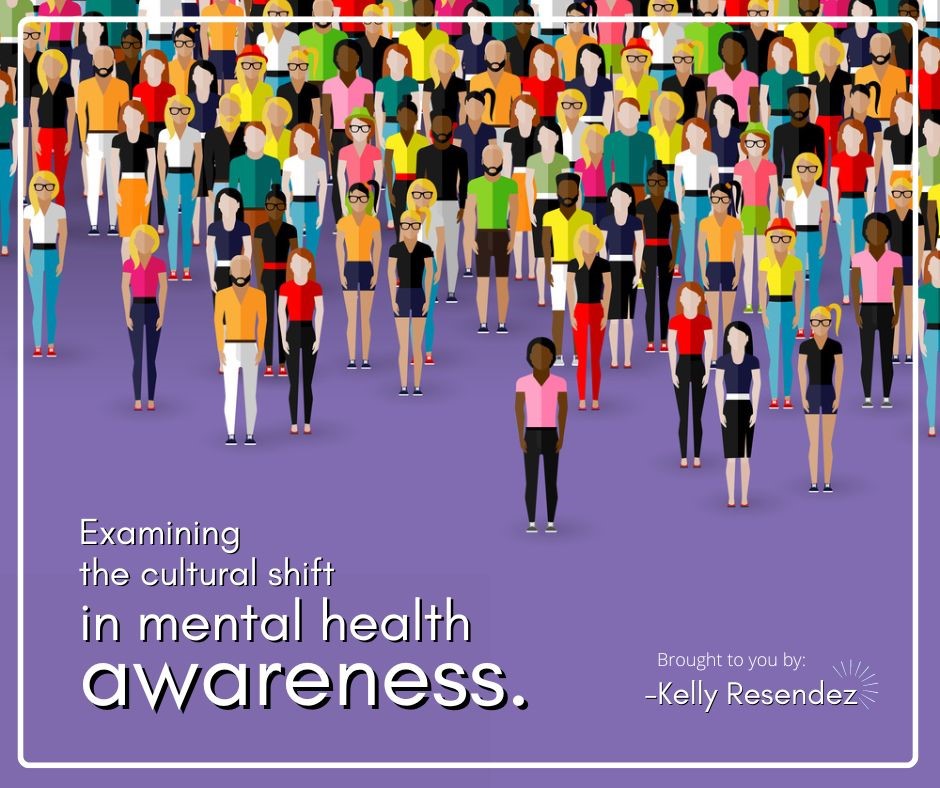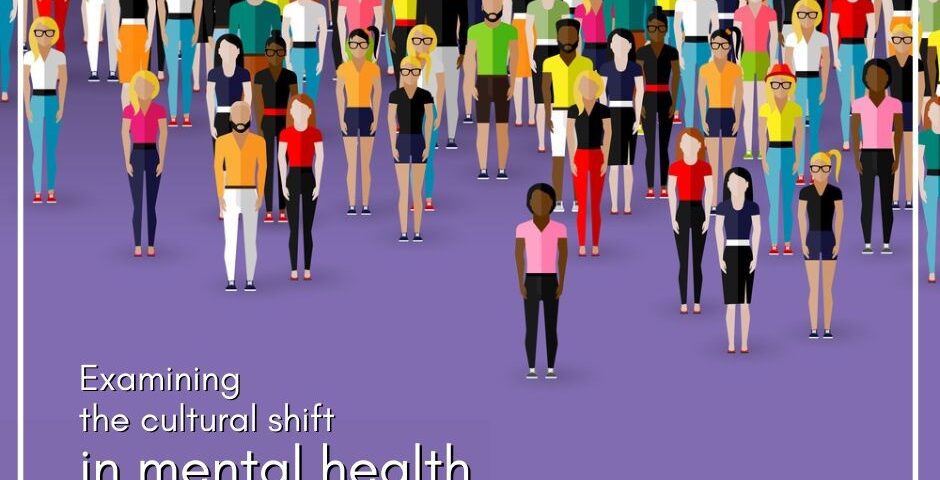
Just Breathe: The science, facts, and health benefits behind our most vital physiological function.
September 22, 2022
Self-regulation is the key to living your best life with anxiety.
November 15, 2022
October 10th was World Mental Health Day, following up on May’s Mental Health Awareness Day and Month in the United States.
It’s important that we observe as many special days, events, and campaigns around mental health as possible. Collectively, we’ve made some great strides in recent years, but we’re also witnessing a greater prevalence of mental illness and stressors than ever before.
So, today I wanted to continue our conversation about mental health (interchangeable with the term ‘mental illness’ in the remainder of this blog), as well as explore a critical tipping point if we’re going to see mental health given the credence it needs – cultural acceptance.
The state of mental health in America
First, let me offer a snapshot of mental health in the United States:
- Almost 20% of all U.S. adults – about 50 million people – will experience a mental illness this year.
- More than 15% of teens and youth experienced at least one major depressive episode last year and 10.6% of youth suffer from severe major depression.
- Almost one in twenty (4.58%) adults report having serious thoughts about suicide.
- And yet more than 50% of adults with mental illness don’t receive any treatment, which adds up to 27 million people. Even worse, over 60% of youth don’t receive treatment for major depression or mental illness.
- In fact, more than 80% of Americans who seek treatment and care for mental health find it difficult to find professional support.
You can find more stats about mental health in America in my past blog here.
Impact of the pandemic on our mental health
The pandemic took an incalculable toll on our mental health, both overtly and in many indirect ways.
It’s estimated that in 2020 alone, the instance of anxiety and depressive disorders rose by at least 25% across the nation. And that’s just counting severe disorders, as most of us felt far more stress and anxiety during those difficult years.
To hear it from Drew Train, Co-Founder and CEO of OBERLAND, a purpose-driven branding agency, “In light of the pressures we’ve all been under since the pandemic began – and particularly in light of the mental health toll it’s taken on young people – it’s important for us as a society to view mental illness in the most objective, progressive and sympathetic way. We see this as one important way to break obstacles to people seeking or obtaining treatment.”
The financial toll of mental illness
The financial impact of our mental health issues and illnesses is staggering. In fact, it’s estimated that mental illness now costs the U.S. economy $193 billion each year, and the reality is probably far greater if you start factoring in ancillary costs.
Likewise, the single biggest cause of emergency room visits (other than childbirth) in the U.S. now is mental health disorders and episodes. In fact, a full 12% (about one in eight) of emergency room visits are due to mental health concerns.
Turning to the workplace, we see the financial (as well as the human) toll of mental illness. And while exponentially more companies and employers are saying the right things and even implementing wellness and mental health initiatives, the reality can often be starkly different.
For instance, 8 out of 10 people surveyed (2022) responded that it’s NOT okay to tell coworkers about mental health issues or illnesses, a number that’s actually gone up since the same question was posed in a 2013 poll.
To illustrate just how much mental illness costs us in lost work hours and other challenges, consider that depression is now the #1 leading cause of disability in the U.S.
Measuring attitudes and norms about mental health
As I mentioned, we’re seeing the start of a huge cultural shift towards open discussion and acceptance around the issue of mental health. By all metrics, we’ve come a long way in just a few years in legitimizing conversations about mental wellness and care.
A recent survey by the American Psychological Association found that:
- 87% say that having a mental health disorder is nothing to be ashamed of.
- 86% of those surveyed believe that people with mental health disorders can get better, and
- 84% said that people with mental health disorders could live normal lives.
- It’s interesting to note that surveys also reveal that more people now believe being prone to mental illness also means you may hold positive qualities like creativity, high I.Q., compassion, and empathy.
However, as a society, we still have room to grow before mental health is treated as seriously and openly as physical health.
For instance,
- 86% of those surveyed still felt that the term “mental illness” carried a stigma.
- 55% still feel that mental illnesses are different than serious physical illnesses.
- 39% said they would view someone differently if they had a mental health disorder.
- And a full third of respondents said that people with mental health issues “scare them.”
Cultural acceptance
While it’s easy to become disheartened just looking at the stats, I wanted to shine a positive light on the progress we’ve made. Day-to-day we’re experiencing exponentially more acceptance, openness, and the capacity to have frank conversations around mental health, especially among young people.
I’ve noticed that much of that progress doesn’t come inch by inch, but in great leaps every time a famous athlete, musician, or movie star publicly pulls back the curtain on their own mental health struggles.
We’ve seen it again and again, and I’ll include names here like Chrissy Teigen, Ben Simmons, Demi Lovato, and the most decorated Olympic athlete ever, Michael Phelps, solely to applaud their courage and compassion.
To me, this is a true bellwether of changing societal norms and values, far more than stats and data can reveal.
Every time someone with the cultural gravity of Lindsey Vonn, DeMar DeRozan, Leonardo DiCaprio, or Lizzo sit in front of the camera and bare their soul, it empowers our youth (and adults!) to shed the stigmas and achieve a new plateau of normalization.
No offense to those working tirelessly in the mental health profession, but one Tweet (or IG story, Tik Tok, Snap, or whatever the heck they’re doing these days!) from Kendall Jenner, Selena Gomez, or Shawn Mendes about their own mental health moves the needle more than all of our campaigns, special days, and yes, even blogs, combined.
With every publicized mea culpa, more and more regular people allow themselves to be vulnerable enough to seek information, ask for help, or just talk about it with those they love.
And when one musician or pro athlete “comes out” about their mental health, others follow. It’s encouraging and uplifting to see the rapidly growing mental health tree in pro sports and, by proxy, among younger generations.
For instance, tennis phenom Naomi Osaka recently withdrew from the French Open, citing her social anxiety after skipping a mandated press conference. She later revealed that she had “suffered long bouts of depression” all the way back to 2018 and was taking a step away to care for her mental health.
Naomi probably wouldn’t have felt licensed to do so if not for Serena Williams, her predecessor and the best women’s tennis player ever, who started the conversation about mental health in her sport.
And Serena may have been influenced by NBA basketball player DeMar DeRozan, who documented his own struggles with anxiety and depression; and DeMar because of fellow ‘baller Kevin Love.
Back in 2020, Kevin Love penned a public essay about his own mental health struggle, in which he said, “It felt like I was on a deserted island by myself, and it was always midnight,” opening the floodgates of conversations around mental health in his sport.
This shift in cultural acceptance is the only way our society will be able to adjust our sails and navigate the mental health storm we’re in the midst of.
So, what’s next?
We will continue to push the conversation around mental health forward, gaining new acceptance and legitimacy every single step of the way.
And every time someone is better informed because of public dialogue, every person who understands what they can do to take better care of themselves, and each instance when someone reaches out to ask for help, it’s another important step in our journey towards fully embracing mental health.



